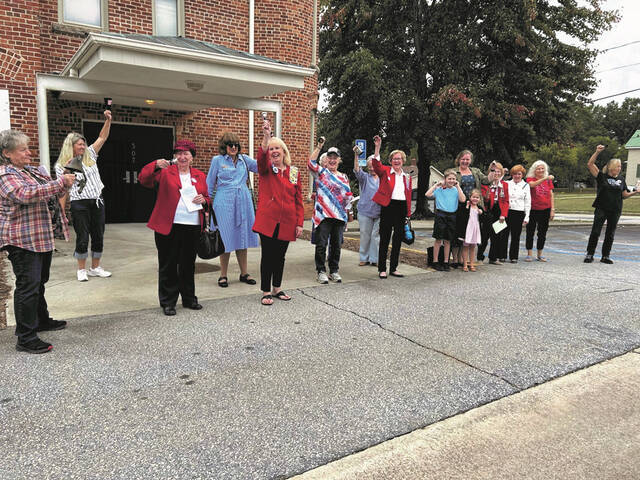
Bells Across America is an annual celebration of the signing of the U.S. Constitution. On Sept. 17, people gather to ring bells at 4:00 p.m. to recreate the church bells of Philadelphia that rang out to signal that the U.S. Constitution was signed in 1787.
Lynda Abegg | The Easley Progress
PICKENS — Housed in the county’s old jail building, The Pickens County Museum of Art & History got a bit noisy when the Daughters of the American Revolution (DAR) started ringing their bells, then the Pickens Fire Dept. joined in with a few blasts from their fire engines. Bells Across America is an annual celebration of the signing of the U.S. Constitution. On Sept. 17, people gather to ring bells at 4:00 p.m. to recreate the church bells of Philadelphia that rang out to signal that the U.S. Constitution was signed in 1787.
Joyce Hansel, Regent of the Fort Prince George Chapter, was relieved when the rain cleared enough for the bell ringing to take place in front of the museum. “I was really concerned we would be rained out,” she said. “I was delighted to see so many generations represented, parents, children, DAR members and friends of the museum, all turned out to ring their bells.”
The U.S. Constitution contains 4,400 words. It is the shortest written Constitution of any major government in the world. There are several spelling errors in the Constitution, but the word “Pensylvania” is the most glaring. Benjamin Franklin, 81, was the oldest signer of the Constitution. He suffered from gout and bladder stones and was carried into the convention hall in a sedan chair carried by four prisoners. The youngest signer was Jonathan Dayton of New Jersey, 26.
George Washington signed first followed by each state delegation. Thomas Jefferson and John Adams did not sign the Constitution. Jefferson was in France, serving as the U.S. Minister to France, and Adams was serving as the U.S. Minister to Great Britian. Four South Carolinians, all from Charleston, signed the Constitution, Pierce Butler, Charles Pinkney, his cousin, Charles Cotesworth Pinckney, and John Rutledge.
Rutledge, was elected Governor of South Carolina in 1776. He repulsed a British attack on Sullivan’s Island and suppressed a Cherokee uprising. When Charleston fell to the British in 1780, his property was confiscated and Rutledge escaped to North Carolina. Today, his home, built in 1763, is the only remaining founder’s home that you can spend the night in. It’s a bed & breakfast located on Broad Street in Charleston. While Washington did not sleep there, he did stop by for breakfast one morning.

